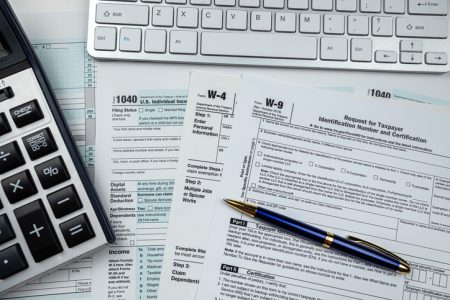When tax season rolls around, homeowners often wonder if property taxes are deductible on their tax returns. The answer is yes—you can deduct property taxes on your tax return. In fact, property tax deductions remain one of the valuable benefits of homeownership under current tax law. These deductions allow you to reduce your taxable income by the amount you have paid in property taxes throughout the year. This could result in significant savings. However, the rules surrounding property tax deductions have evolved in recent years. Not all property-related expenses qualify, and there are important limitations to understand.
Before you file your taxes, consider working with a financial advisor to ensure that your personal finances are in order.
Understanding the Property Tax Deduction
Homeowners who pay property taxes and itemize deductions on their federal tax returns can claim this deduction. This includes owners of single-family homes, condominiums, co-ops, mobile homes and even vacant land (for homeowners who plan to build a home on it). However, if your lender pays your property taxes through an escrow account, you can only deduct the amount paid to the taxing authority during the year.
Lastly, timing your property tax payments strategically can help maximize your deduction. If you are close to the SALT cap limit, consider whether prepaying or delaying property tax payments between tax years might be beneficial. Always keep detailed records of your property tax payments, including statements from your local tax authority and mortgage lender.
How Much of Your Property Tax Can You Deduct?
The property tax deduction has a $10,000 cap each year. This applies to the combined total of state and local income taxes, property taxes and sales taxes.
This SALT cap significantly impacts homeowners in high-tax states. For many homeowners in areas with high property values, it means they cannot deduct their full property tax payment. Additionally, you calculate property taxes paid on rental properties differently. You deduct them as business expenses on Schedule E.
How to Deduct Property Taxes on Your Tax Return

To deduct property taxes on your tax return, you must itemize deductions rather than taking the standard deduction. Since the Tax Cuts and Jobs Act increased standard deductions significantly, you must determine whether your total itemized deductions exceed your standard deduction. For many taxpayers, the combination of property taxes, mortgage interest and other eligible expenses makes itemizing worthwhile.
The IRS allows you to deduct property taxes in the year you pay them, not when they are assessed. This flexibility in timing can create opportunities for tax planning. Some homeowners choose to prepay property taxes in December to claim the deduction in the current tax year. However, changes to tax law can limit this strategy in certain situations. Therefore, it is best to consult a tax professional to find out if this is an option for you.
Make sure you maintain thorough records of your property tax payments, including tax bills and payment receipts. If your mortgage lender pays property taxes through an escrow account, your annual mortgage statement (Form 1098) will show the amount paid. This documentation is essential if the IRS questions your deduction or if the IRS selects you for an audit.
Other Tax Deductions Related to Your Property
Beyond standard property tax deductions, homeowners can take advantage of several other tax benefits related to their property. These deductions can significantly reduce your tax burden when properly documented and claimed.
- Mortgage interest deduction: You can deduct the interest paid on your mortgage for your primary or secondary residence. This deduction is particularly valuable in the early years of your mortgage when interest makes up a larger portion of your monthly payment. Remember to check your Form 1098 from your lender for the exact amount of interest paid during the tax year.
- Home office deduction: If you use part of your home exclusively for business purposes (note that this is only available to business owners, not employees), you may qualify for a home office deduction. This allows you to deduct expenses related to the business portion of your home, including utilities, insurance and depreciation. You can choose between the simplified method (based on square footage) or the regular method (calculating actual expenses).
- Home equity loan interest: Interest on home equity loans or lines of credit may be deductible if you use the funds to buy, build or substantially improve the home that secures the loan. This deduction can provide significant tax savings for homeowners who have leveraged their equity for home improvements.
- Energy-efficient home improvements: Certain energy-efficient upgrades to your property may qualify for tax credits. These can include solar panels, energy-efficient windows or heating and cooling systems that meet specific requirements. Unlike deductions, these credits directly reduce your tax bill dollar-for-dollar.
Bottom Line

Understanding property tax deductions can significantly impact your tax situation. Yes, you can deduct property taxes on your tax return, but with important limitations. The Tax Cuts and Jobs Act of 2017 mandates a $10,000 cap for the total state and local tax deduction (including property taxes). This applies to both individual filers and married couples filing jointly. To claim this deduction, you must itemize rather than take the standard deduction. Therefore, this benefit primarily helps homeowners whose total itemized deductions exceed the standard deduction threshold.
Tax Planning Tips for Homeowners
- If you’re looking for ways to lower your tax liability, a financial advisor who specializes in tax planning can help optimize your finances. Finding a financial advisor doesn’t have to be hard. SmartAsset’s free tool matches you with vetted financial advisors who serve your area, and you can have a free introductory call with your advisor matches to decide which one you feel is right for you. If you’re ready to find an advisor who can help you achieve your financial goals, get started now.
- If you want to know how much your next tax refund or balance could be, SmartAsset’s tax return calculator can help you get an estimate.
Photo credit: ©iStock.com/izusek, ©iStock.com/fizkes, ©iStock.com/FatCamera
Read the full article here









